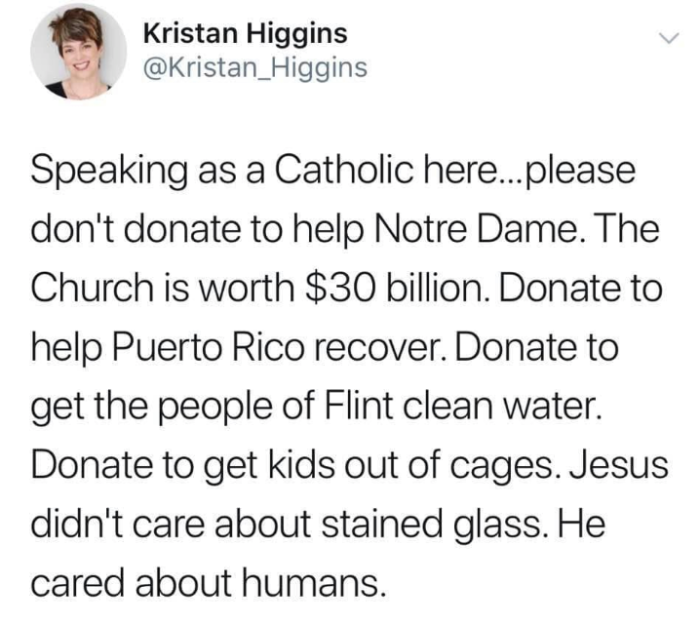Notre Dame Aftermath: Yes, Jesus Cares About Stained-Glass Windows
This tweet about Notre Dame has since been deleted. But, alack, too late, it’s been screencapped and shared all over the place:

Clearly the entire internet had some reactions to this. Which is why I don’t blame the author for deleting the tweet. (For more Twitter-related disclaimers, see this footnote: 1.) Still, since it’s out there, we can compare the thought with some milder versions voiced (or at least thought) by Christians.
Their thought may go something like this:
Well, church is more than a building, right? And wouldn’t it be better to use our resources to help the poor instead of invest in giant church buildings?2
But let’s reduce the question to the dichotomy:
Does Jesus care about humans or about stained-glass windows?
It’s a false dichotomy, of course. The answer is yes.
Jesus cares about humans, and about stained-glass windows and cultural works made by humans.
I answer this way for these reasons.
First, by that question, we may as well ask, Does God (in the Old Testament) care about the Israelites? Or does he care about the Tabernacle’s golden lampstands? Again, the answer is that God cares about his people and he cares about the lampstands and everything else he asked them to make for his Tabernacle.
Second, though, people could say that God told his people to make lampstands. He said nothing about making stained-glass windows.
But my objection would remain the same: whether it’s lampstands or stained-glass windows, we still can’t use the “poor people versus church buildings” dichotomy. In the Old Testament, God certainly made provisions for the poor (in a theocracy). But he also commanded the people to melt down their gold, collect resources, and call specially gifted artisans3 to make amazing things for his Tabernacle. Why? My favorite biblical phrase for creative purpose is “for glory and for beauty.”4 Skilled creative work glorifies God, just as poverty relief glorifies God.
Third, notice that I’m here doing something very counterintuitive. I’m making a God-directed argument. Sometimes I forget how revolutionary this may sound. But I must draw the contrast: per God’s written revelation, the Bible, and per its gospel, the universe is a God-centered universe. It’s not a universe centered on Good Deeds, or The Poor, or Human Charity. God is the axiomatic source of all goodness in the world. In him all these moral laws hold together.
Whereas, what happens if we try to make the universe all about these human-directed goals? As moral as this approach may sound, we’re actually trying overthrow all the laws of spiritual physics. If we ignore God, we can keep things together for only so long. But soon we’ll be shocked to find that the very molecules of presumed human morality will come flying apart.
Human beings versus human culture?
Fourth, it’s silly to pit God’s affections toward “people whom God loves” versus “things made by people whom God loves.” If you’re a parent, and your child draws you a happy picture, you value this precisely because your child made it. Only a foppish dolt would reply, “That’s very nice, dear, but I only care for you, not this absurd picture that is worthless.”
Fifth, that’s the shorter version of this argument: God made people to make culture. People’s culture-making both reflects God’s creativity, and brings glory to his name. For more, see Genesis 1:28, or any solid article about the “cultural mandate.”
Yes, since God gave this mandate, we’ve had a great fall into sin. Sin brought down hideous human suffering, including poverty. But God has not withdrawn the cultural mandate. If he did, then he would also need to withdraw that whole “be fruitful and multiply” command that he gave at the same time. Weird how our Lord is, instead, a multitasker. He lets people keep having children and making culture, with righteous and evil motives all tangled up either way. And in the meantime, he’s called out his people, the Church, for a special Great Commission. (More on this as we close.)
Sixth, no one can actually follow this “people versus created things” standard anyway. I note with mild amusement that our tweet-deleting author here is a creator of books. Shall we rudely inform her that she has quite enough money, thank you, and that it’s unspiritual to write books for a living, what with all this poverty and suffering in the world? Similarly, when a Facebook friend shared this screencap, I casually remarked that if we pursued this logic, we’d have to avoid social media activity, poetry, and any creative exercise.
Seven, alas, this “human beings versus human culture” line is a very familiar notion. Growing up, I caught scent of this. People were always trying to pass off the half-baked doctrine that claims: “Life is only about [my preferred moral or spiritual cause], and your creative work has no significance.” Evangelicals do this when they speak and act as if evangelism is man’s chief end. And religious believers from all factions do this to promote other moral causes, such as poverty relief.
Sure, if you over-value human cultural works, you might need a perspective check. That may include poetry, film, or stained-glass. But even if you came to this conclusion, you’d need to instead promote the Great Commission. Merely repeating “help the poor” doesn’t cut it. Instead, Christ’s mission for his people is centered on discipling other people. Yes, this includes goals like poverty relief. It also includes creative works such as writing, music-making, and crafting amazing buildings. Or at least finding the common grace that God has given to people who craft great buildings (whether or not they mean to exalt him).
What a great mission. What an an amazing, creative Savior, who is glorified both through overt evangelism/charitable acts, and through amazing artwork that draws the human imagination toward his transcendence. Which, by the way, also really helps The Poor. After all, why would we assume that The Poor only need life’s basics and not also art, beauty, and glory?
- First, Twitter isn’t real human culture. It’s both more so and less so, all at once. That’s the magic of social media. Second, people have the absolute right to remove their Tweets if the attention is getting in the way of their normal lives. Third, this Twitter-er, Kristan Higgins, seems to be a pleasant person, and has a book called Good Luck With That. Fourth, for pleasant or unpleasant people alike, everyone says things in reality that they wish they could unsay. Twitter merely freezes these moments in time, to the intrigue and detriment of all. Regardless, for God’s sake, let’s be charitable, even on Twitter, and even for the nasty people ↩
- Conservative Protestant folks could take this criticism even further, almost sounding a bit “woke”: These cathedrals were built by suspicious characters. Some of them exploited the poor to build them. ↩
- The two named are Bezalel and Oholiab (Exodus 31:1–6, 36–39). In fact, Bezalel, a skilled creative craftsman, is the first person the Bible describes as “filled . . . with the Spirit of God” (Exodus 31:3). ↩
- Exodus 28:2. ↩













Hm…well, we wouldn’t tell a child their picture is worthless, but we would still prioritize the child over the picture they made. It’s not ENTIRELY bad for someone to wonder why people are more worried about donating to fix a building than they are to actual people. If I or a younger relative was hurt/starving/whatever, I would probably rather see them fed and safe before seeing a building remade. People also wonder why people get absolutely angry over a lion getting shot in Africa when there are tons of children starving or being murdered every day.
When it comes to people’s reactions, there’s probably a sense of ‘newness’ and a matter of what issues are in front of people at the time. People don’t hear about lions getting shot or Notre Dame burning down every day, so it upsets them, whereas they hear about starving children and social justice stuff all the time. They care about social justice issues and get upset about them sometimes, but by now are probably a little more desensitized to them.
That said, there are already people donating to help others in need. Obviously, we need more donations to help children, etc, but donating to Notre Dame won’t perpetually keep people from donating to other causes. Also, Notre Dame is of great historical and economic importance, so rebuilding it actually DOES help people. It attracts tourism, which gives people jobs, etc.